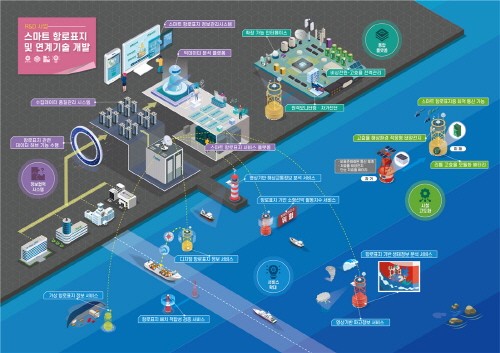KRISO Spurs Technological Development to Usher in an Era of Smart Maritime Transportation
□ The Korea Research Institute of Ships & Ocean Engineering (President Hong Key Yong, hereafter 'KRISO') announced its successful development of the Smart Aids to Navigation Service, a technology aimed to ensure safe ship navigation, and completion of its open-water demonstration test in Singapore.

< Conceptual diagram of Smart Aids to Navigation System >
□ Typically, the term navigational aids (such as lighthouses, light marks, light buoys, and beacons) refers to devices or facilities that facilitate marine traffic by indicating dangers of obstacles or reefs, or by providing information for navigation. Ships determine their navigational routes based on the location, shape and color of the navigational aids and real-time information on marine weather.
□ However, challenges remain in timely updating of ships regarding the status information of the navigational aids, such as failures, new installments or terminations, as well as allowing adequate checks on frequent changes of the aids and other necessary information with conventional electronic charts.
□ In response, KRISO continues its research on marine information management and service technology, based on information collected from navgational aids. The technology also enables timely checking of changes in navigational aids via on-vessel navigation systems and supports safe navigation of ships by providing virtual navigational aids in sea areas that do not allow the physical installation of such aids.
□ With the aim to verify compliance of the service's navaid information management, exchange, and servicing processes against international standards, KRISO conducted an open-water demonstration test in Singapore, as well as successfully validating its navaid-based navigational warning and change notification service using land and ship navigation systems.
□ Based on the results of the open-water test, KRISO plans to collaborate with the International Association of Marine Aids to Navigation and Lighthouse Authorities (IALA) and the International Hydrographic Organization (IHO), in their efforts to develop international standards and service standards in navigational aid information, which in turn would enable Korean technology to lead the world in standardization.
□ KRISO's Chief Researcher Oh Sewoong explained, “as navigational aids are essential in ensuring safe navigation of ships, we will continue to witness an increasing demand in credible navaid information and expansive marine information as next-generation electronic charts or autonomous vessels continue their entry in the future.” He further expressed his commitment to “creating a safer and more convenient marine transportation environment by continuously engaging in research and development of navigational aids and marine transportation and safety technologies.”
□ Furthermore, KRISO plans to play a critical role in the digital transformation of the marine sector as a leading R&D instutition for core service technologies, such as by revamping the integrated information collaboation system to standardize and digitalize currently dispersed information and data on navigational aids, marine traffic, and marine weather, and initiating a project to build an information service system that leverages big data collected from the Smart Aids to Navigation System, which is much needed in the ever-changing marine traffic environment.

 Research Project
{{data.S ? data.S.sum : 0}}
Research Project
{{data.S ? data.S.sum : 0}}

 Patent
{{data.P ? data.P.sum : 0}}
Patent
{{data.P ? data.P.sum : 0}}

 Technology Transfer
{{data.T ? data.T.sum : 0}}
Technology Transfer
{{data.T ? data.T.sum : 0}}

 Thesis
{{data.R ? data.R.sum : 0}}
Thesis
{{data.R ? data.R.sum : 0}}











